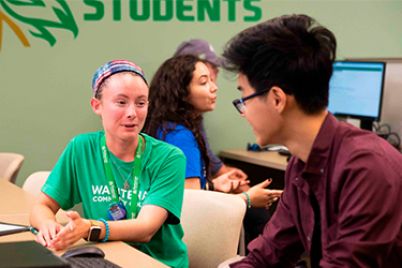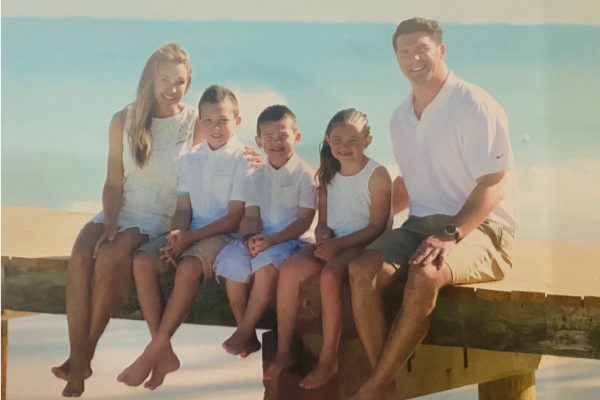
Michigan native Mark Campbell with his wife Michelle and their three children. Courtesy of Mark Campbell
By Kristy King
Staff Writer
Mark Campbell is a husband and father of three who won a National Championship at the University of Michigan under Lloyd Carr. He also beat COVID-19. After playing 10 years as a tight end in the NFL, this Michigander thought he was going to mentally push through it like the grind in football. Instead, he learned the coronavirus was not like any opponent he had seen before.
“In simple terms, think of the worst flu you’ve ever had, but then add pneumonia,” said Mark Campbell, CEO of MedKinect. “It doesn’t start out as that, but progressively becomes that.”
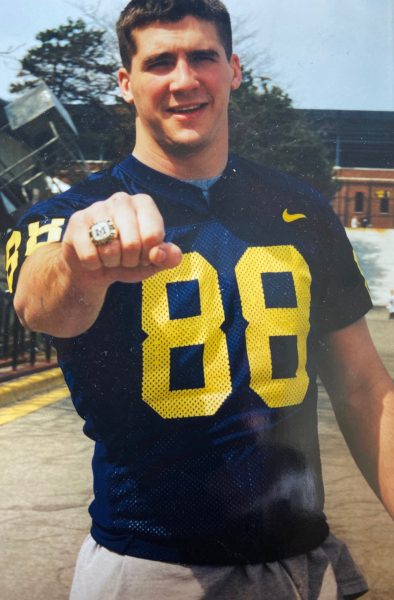
Former University of Michigan tight end, Mark Campbell, with his 1997 National Championship Ring. Courtesy of Mark Campbell
To this day Campbell is unsure of how he contracted the virus, but blames it on a gas pump that he thought twice about.
“Back in early March, businesses were not yet closed and before the stay at home executive order was in effect, my wife Michelle and I took our kids skiing up north,” Campbell said. “It was the last ski weekend which we thought would be good for the kids and was relatively safe being outside basically secluded from one another. We were only around family and close friends. I was the only one that got it.”
Campbell’s symptoms started like the common flu, feeling fatigued on day one, followed by a high temperature on day two.
“I had a 102 temperature that I blamed on the hot shower I had taken 30 minutes prior,” Campbell said. “I took it again later with the same result and thought ‘no way I have it.’”
At this point, drive-through COVID-19 screenings were just being assembled, so Campbell decided to go.
“I felt like I was in the movie ‘Contagion’,” Campbell said. “There were people in masked suits, lights flashing, and cop cars. They took my temperature and I didn’t have a lot of symptoms, along with no underlying medical issues, so they wouldn’t give me the test. They did tell me that I probably have it and to go home and quarantine for 14 days, but gave no real definitive answers to me.”
Campbell went home and stayed in his basement, sleeping 18-20 hours a day while his wife, Michelle, left rations at the top of the stairs. On day five, he developed a cough and lost his sense of smell. It was when he couldn’t taste food that he knew he had a problem.
“For a guy that’s a foodie, that’s the worst,” Campbell said. “My wife brought down pizza, because that’s my favorite, which I took one bite of and wanted nothing to do with it. I lost 25 pounds and I was in relatively good shape prior to that.”
Day seven was when Campbell started waking up and had shortness of breath, but like every athlete he pushed through it. However, by day 12, after getting gradually worse every day and struggling to breathe while coughing, he knew it was time to surrender the fight at home. He headed to the hospital.
“I wasn’t positive they would accept me, but I knew I was in bad shape,” Campbell said. “I was admitted in about three minutes.”
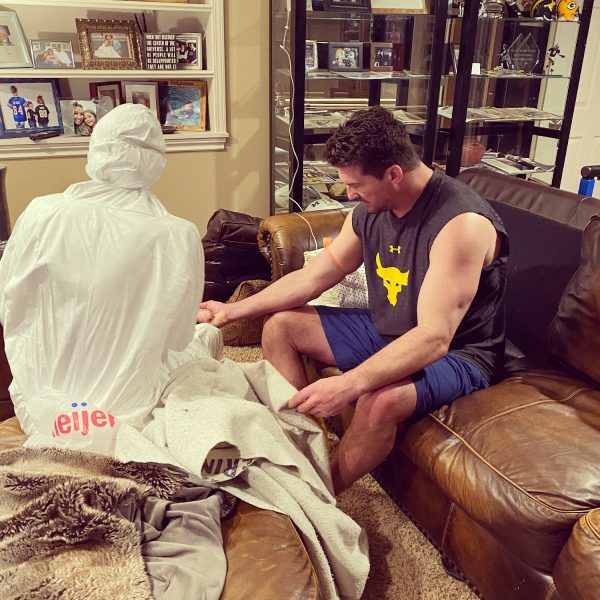
Medical staff administers IV during quarantine at Mark Campbell’s Michigan home. Courtesy of Mark Campbell
Campbell remembers emergency room personnel whisking him away and not really giving any direction because they were working so fast. He didn’t mind because he felt so relieved once they gave him oxygen.
“I had a moment with my wife when I was being admitted. I realized I was in bad shape and wondering if I would see her again,” Campbell said. “How’s our finances? Where’s the paperwork? You have 15 clear thoughts in one second.”
In the hospital, Campbell finally got a COVID-19 test. “I was a little uncomfortable at the time,” Campbell said. “I asked what the hell was that which was the COVID test.”
He reflected on the first 24 hours as the medical staff decided whether or not to intubate him, which he didn’t want. His day was consumed with IV’s, Z-Pak, and rest. He didn’t mind because he was so happy he could finally breathe. There were no changes with how he felt, so on the second day in the hospital they administered hydroxychloroquine. An arthritis medicine that also can be used to prevent malaria, hydroxychloroquine has been tried in COVID-19 cases, though the FDA now cautions against its use.
Campbell was clear that he could only speak for himself regarding the drug as a healthy male with no comorbidities, and acknowledged the drug has been controversial.
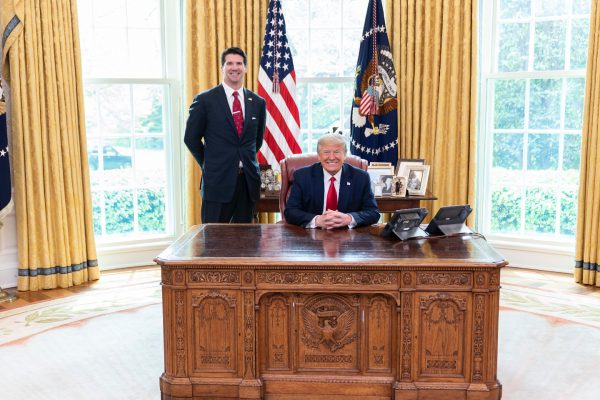
Mark Campbell visited President Trump on April 14, 2020, to discuss his COVID-19 experience. Courtesy of Mark Campbell
“That drug was the game changer for me,” Campbell said. “In eight to 12 hours everything changed and even my thought process changed. The next 48 hours I was thinking ‘how do I get out of here?’”
On his fifth day there, Campbell was discharged from the hospital and told to go home and quarantine again. He finally received his results from the test, and they were positive.
After the irony of this experience, Campbell knew that his lab wanted to get involved.
“We had a toxicology lab already which basically does urine drug tests,” Campbell said. “Last year we opened a molecular lab which is a more complex diagnostic tool of a laboratory, which does a lot of diagnostics for cultures, wounds, diseases, and entails COVID-19 testing.”
He explained how some people are under the impression that COVID-19 testing is a money maker, but the truth is it doesn’t bring in a great deal of profit. “After we saw what I went through we just wanted to help a lot of people,” Campbell said.
Campbell went on to say that luckily everything worked out for him, and expressed how grateful he was that it did. He praised his wife Michelle who took care of not only their three children, but everything else while he was quarantining for about a month. “She’s a trooper,” Campbell said.
Listen to the complete interview below.

